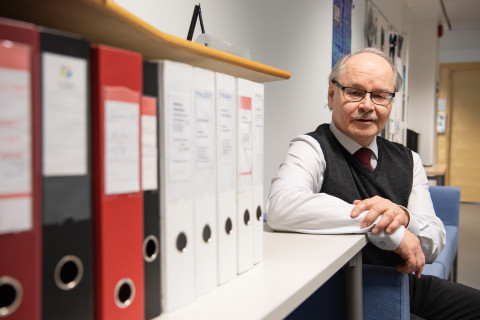The central government of China has been strongly committed to the development of social work education since the 2000s. Chinese universities have taken an active approach to developing the field's academic education, and they have also turned to Europe for example.
“European social work has a strong orientation towards the welfare state, whereas the American tradition is more focused on the individual, placing more emphasis on therapy. The European model is closer to the traditional Chinese way of thinking,” Professor of Social Work Juha Hämäläinen says.
Ever since the early 2010s, social work at the University of Eastern Finland has been collaborating with the Shanghai-based Fudan University in the development of education and research in social work. Over the years, the partnership has been complemented by Sun Yat-sen University and Nanjing Normal University, as well as by the Universities of Gothenburg, Keele and Hertfordshire as key European partners.
Sino-Finnish Centre for Child Protection Research is a significant platform for collaboration
According to Hämäläinen, the Sino-Finnish Centre for Child Protection Research, established by the University of Eastern Finland and Fudan University in 2016, constitutes a significant platform for collaboration. The mission of the centre is to further develop research-based child protection in China and, in doing so, promote child protection legislation and its enforcement.
“In our joint research projects, we have identified significant cultural factors that define the Chinese mindset and conception of family. In part, these factors explain some of the emphases of Chinese child protection.”
Unlike Finland, for example, China doesn’t have separate child protection laws. However, a new family law was passed in China three years ago, and this legislation contains elements of child protection.
“Thanks to this, child protection has taken significant steps forward in China. However, there are still problems with the enforcement of this legislation, and some of them are related to Chinese traditions.”
Family work in Yunnan focuses on supporting left-behind children
China’s left-behind children constitute a major theme of research for the Sino-Finnish Centre for Child Protection Research. With parents taking up jobs in cities, there are millions of children in rural China who have been left behind in the care of their relatives and neighbours.
“This is a major challenge for the Chinese society. We are involved in a project led by Fudan University in Yunnan, a poor province in the south of China. Working together with the local government there, we are developing structures of family work and child protection to support families that are affected by this migration in particular."
Developing practical training in social work education
In China, there is a need to enhance collaboration between academic social work education and organisations operating in the field. Currently, a project funded by the EU is working to develop working life relationships in social work education, focusing on practical training in particular. In addition to the universities, two Chinese national-level academic social work organisations are also participating in the project.
“In the project, we train instructors who are familiar with the studies in practice, as well as skilled practical training counsellors for the field of social work. In addition to developing pedagogical practices, we also produce educational materials and a manual for practical social work counselling.”
“Research-based development stands in the core of this project, and it is a key element of modern social work.”
“We have partnered up with the leading universities in China. They have internalised the idea of research-based social work and research-based development very well, and this concept has made it easy to move forward in our collaboration,” Hämäläinen says, pleased.
Researcher mobility and various research visits constitute a key element of the collaboration. The Kuopio Campus has hosted visiting professors from China, and researchers from the University of Eastern Finland have had an opportunity to work in China. The next visit of the Chinese partners to Kuopio will be on 1–5 April, during which they will learn about the city’s social work, among other things.
Photo: Juha Hämäläinen emphasises that collaborating with Chinese universities has also given new perspectives to the development of social work education in Finland. “For instance, we have paid increasing attention to the practical organisation of social work education and to how the idea of research-based social work is realised therein.”
